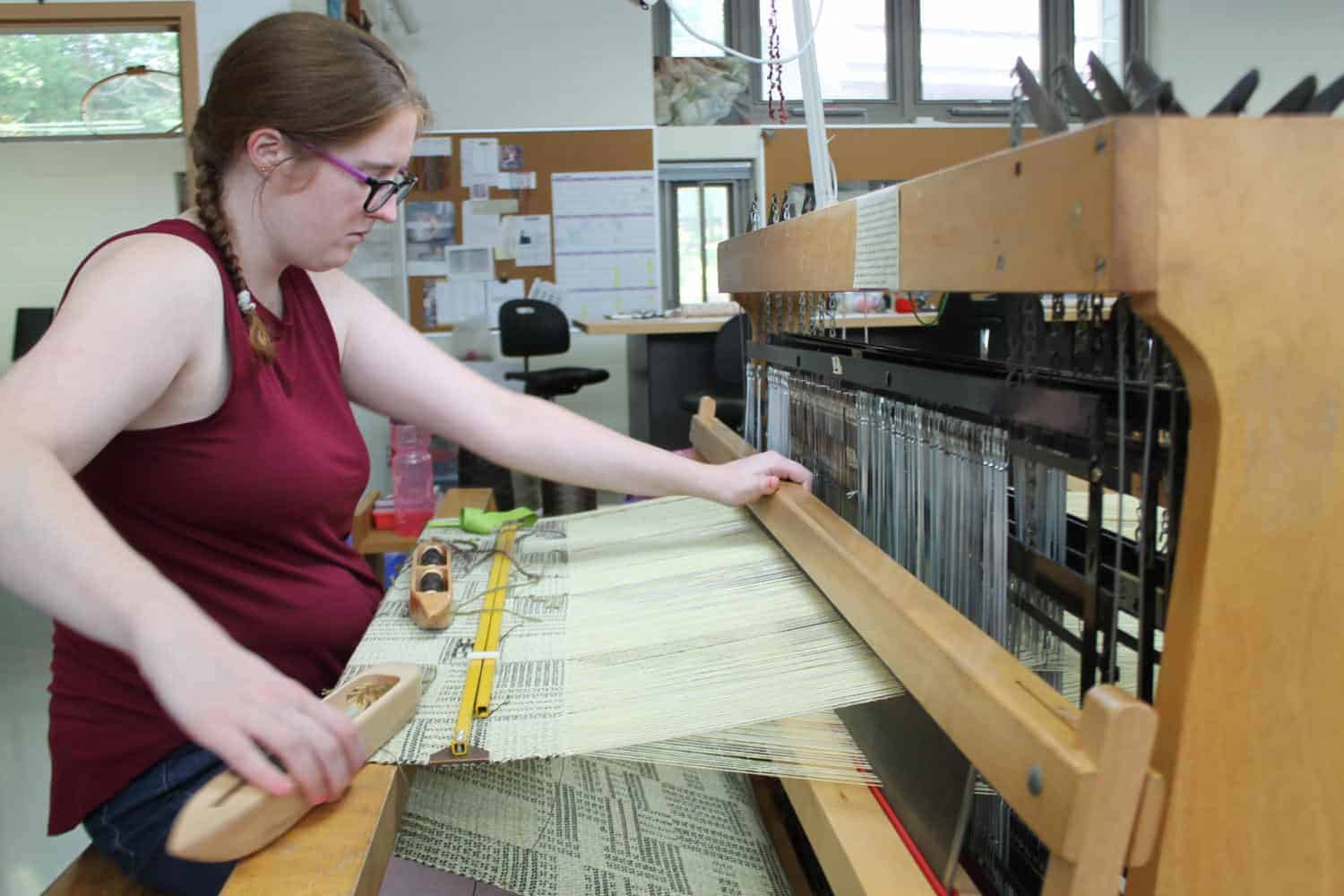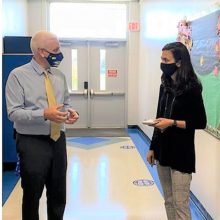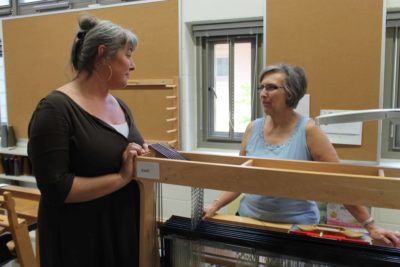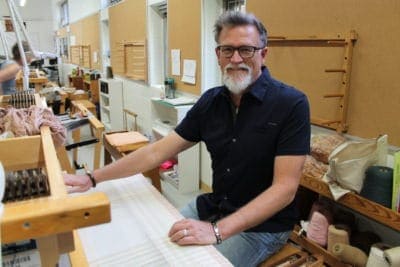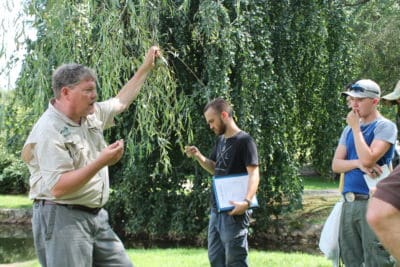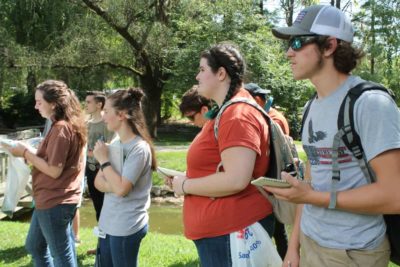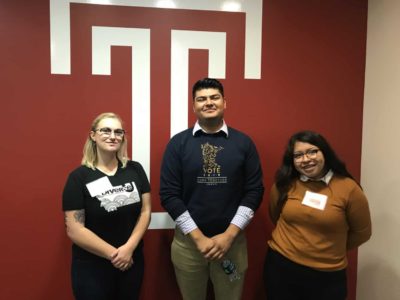Through EducationNC’s blitz of the 58 community colleges across our state, we learned about world-class mechatronics programs, high-tech robots used to simulate patients in a hospital, the ins and outs of welding programs, and economic development initiatives that fuel local and regional economies. These programs are the cornerstones of many community colleges in North Carolina.
During the blitz, we asked the colleges to show us programs that make them unique and reflect connections with their local communities. While Haywood Community College certainly offers advanced machining, electronics engineering, mechatronics, and other programs found at many community colleges, they also keep tradition alive through unique programs that tie the college to the culture of the community and region.
For more data about Haywood’s service area, click on the flash card below.
A nationally-known fiber program
Driving through the streets surrounding Haywood Community College, it’s impossible to miss the billboards, street signs, and banners directing you to independent craft shops selling textiles, fabrics, and woven goods. The tradition of fabrics in western North Carolina dates back to the early 20th century when textiles, tobacco, and furniture dominated as the big three industries of the state. North Carolina soon became the textile manufacturing center for the entire country.
As textile manufacturing began to move overseas during the 1980s and 90s, large factories closed and many textile workers lost their jobs. More recently, independent craft shops are keeping the textile tradition alive.
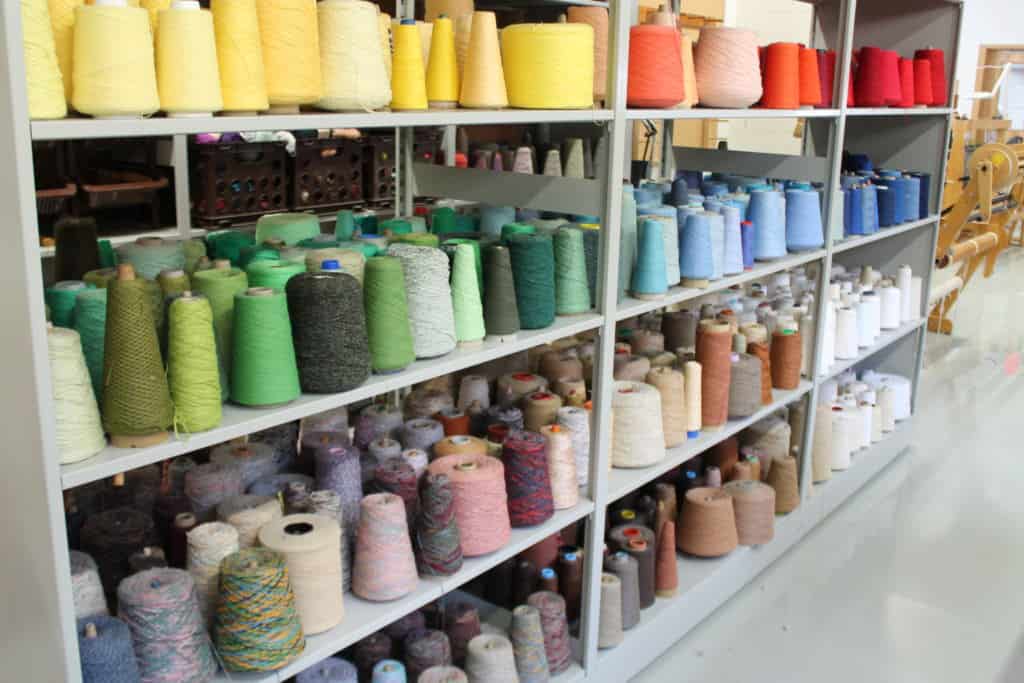
As fiber arts programs at colleges and universities across the country continue to dwindle, the fiber program at Haywood Community College is flourishing in its 42nd year on the campus and attracts students from across the country. Becky Duex, a second-year student in the program, was living in Baltimore when a quick Google search for fiber programs turned up Haywood Community College as a top result. After working in a retail yarn store and making yarn in a mill, Duex was eager to find a program that would provide a full immersion in the craft of weaving.
She bookmarked the page about Haywood’s fiber program on her computer for three years until she found herself visiting a friend in North Carolina and decided to stop by the campus.
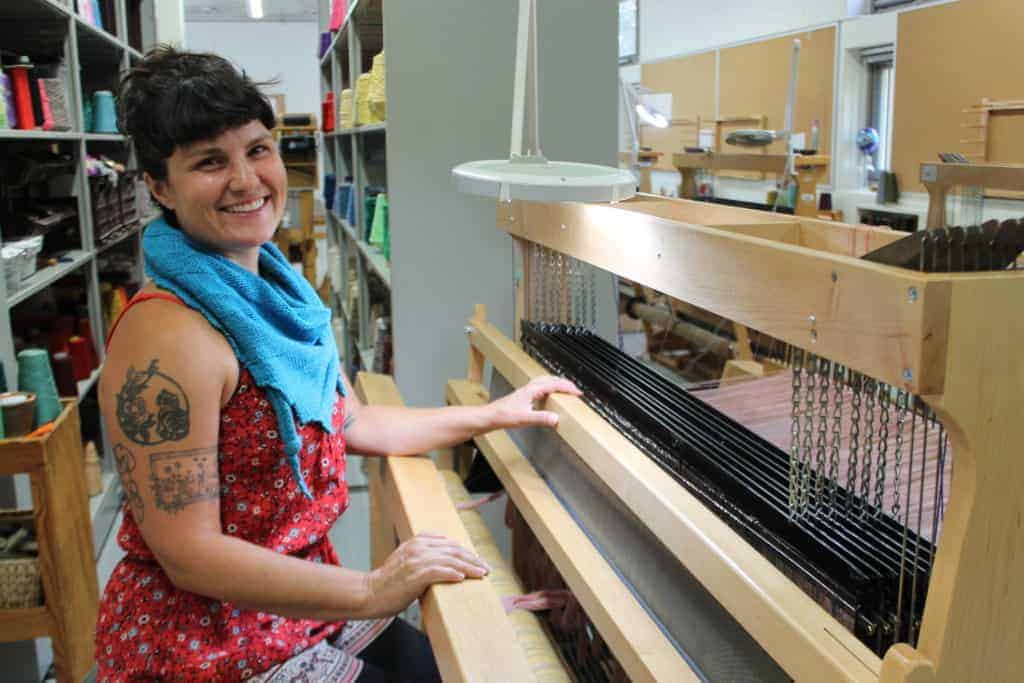
“Pulling into the campus, I thought it was probably the most beautiful community college campus I had been to. It felt very welcoming,” said Duex. “Then I met Amy and got a tour of the studio and knew it was something I was definitely interested in investing my time and money in.”
Amy Putansu, the fiber instructor at Haywood, moved across the country to teach for the same reason as Becky — the program is just as immersive for the instructor as it is for the students.
“I can only have a total of 14 students between first- and second-year students, which could be a class of six students and a class of seven. That means a lot of individual attention and very long studio hours,” said Putansu.
In all of the professional craft programs at Haywood, students receive a dedicated work bench for the entirety of their program. The fiber arts program also includes components on business, marketing, and entrepreneurship for craftspeople.
“The idea is that graduates can leave here with the craftsmanship, the design skills, and the business skills to support themselves to a greater or lesser degree with this pursuit,” said Putansu.
Fiber alumnus Tony Embrey has done just that. After graduating from the program, Embrey created his own textile business, Man-Made Textiles, that specializes in a scarf called the “mandana hug.”
“After I graduated, I rented a studio and did my first show at the Biltmore Village in August. I just finished doing the show again this year. One of the things they taught us in the business class was to do a show three times,” said Embrey. “For me, people come back. They say, ‘I saw you last year’ – and it really does ring true. All those things you go through in school come back to you.”
Teaching in a living classroom
Haywood Community College’s entire campus is an arboretum that is home to hundreds of species of trees. The campus is one of only 16 colleges and universities in the state to receive the recognition of Tree Campus USA. Beyond the beautiful environment this creates for faculty and students, this unique quality allows the campus to turn into a living classroom for students in the natural resource management program.
Shannon Rabby, a graduate of the college who now teaches in the natural resources management program, uses the trees on campus during the lab component of the coursework.
“For me personally, it changed my life entirely that I went to this college — specifically the programs we have here and the expertise we have here,” said Rabby of his own experience in the fish and wildlife management and forest management programs. “We have a really good reputation for natural resource management programs where we are working in the woods and on the water to take care of our natural resources.”
Pointing to a tree next to a pond on campus, Rabby asked his students to identify the species. Students gathered around the tree, notebooks in hand, to take a closer look.
“That’s right — salix babylonica, also known as weeping willow. Weeping willow is not native. It’s from Asia and it is frequently planted in the United States,” said Rabby. “What’s the word that you might use to describe this leaf shape? The more we use the words, the better we’ll get at this.”
According to Rabby, Haywood Community College also owns two teaching forests that allow their students to learn in a living classroom.
Competitive timbersports
Haywood Community College boasts one of the few timbersports teams in the state and fields a competitive team of athletes in state and national competitions. The timbersports team, also known as the Haywood Lumberjacks, is the college’s only athletic team. Competing in national intercollegiate meets, the Lumberjacks often out-perform four-year universities like NC State and Appalachian State.
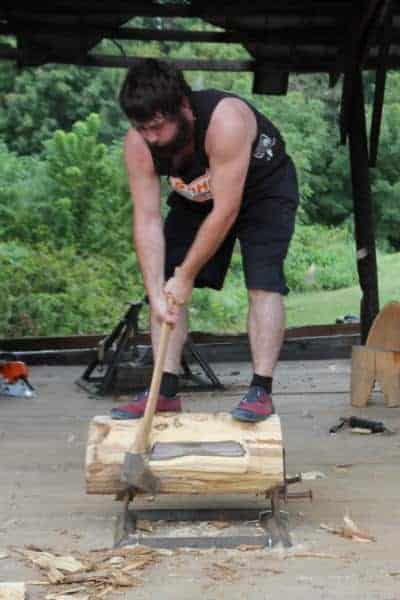
According to James Jeuck, the college’s timbersports coach, the team competes in about 22 different events in both men’s and women’s categories. Events include everything from the axe throw to horizontal speed chops to pole climbing.
“We get a lot of folks who come here and have no experience doing it … or folks like Dillon who’s just been doing this for a week and just started climbing three or four days ago,” said Jeuck. “The thing that’s really neat about this — I’m supposed to be the coach — but that’s really in name only. They’re the coaches. They teach each other.”
At @HCCClyde, the Haywood Lumberjacks compete nationally in timber sports. Here’s a student who has only been on the team for two weeks, completing the pole climb in under 3 seconds ? The team slogan is “We cut wood good” ? pic.twitter.com/2Pz3Ylu7iu
— Analisa Sorrells (@analisasorrells) August 29, 2018
Meeting students where they are
As Vice President of Student Services, Dr. Michael Coleman says, “life happens.” Haywood Community College recently became one of about 20 community colleges in the state to use a program called Aviso that allows them to closely track students and proactively work to prevent students from slipping through the cracks.
“Faculty members can instantly know if something is going on with their students. If a faculty member sees something that they don’t think is quite right or a student starts to miss classes or their behavior changes, they can do an alert in this program and all the faculty become aware of the issues and the student advisor becomes aware,” said Coleman. “It’s a robust system that allows us to engage with students early on before they disappear — because inevitably, life happens.”
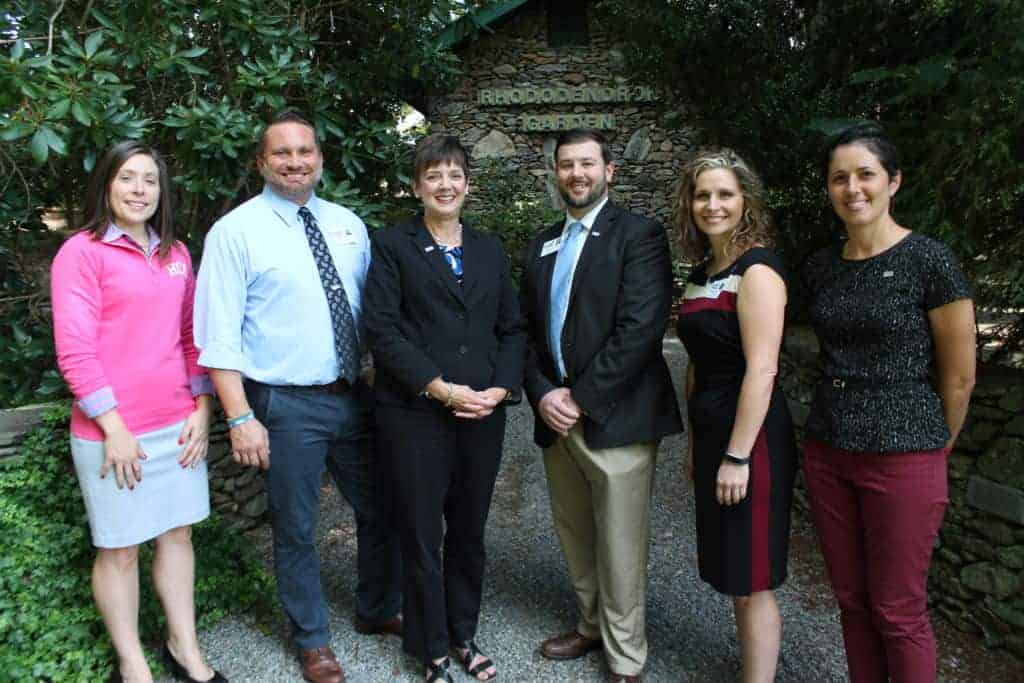
Coleman said this technology is especially useful because all of Haywood Community College’s students are incredibly diverse; some are dual-enrolled high school students while others are adult students returning to further their education through continuing technical education programs. Many of Haywood’s students work full time and are balancing the demands of trying to make ends meet while also working towards a degree or credential.
A product of North Carolina’s community college system, Coleman received a degree in architectural technology from Nash Community College and previously worked there as the dean of student and enrollment services. When asked what keeps him up at night, his response was simple: the students.
“You don’t do this line of work unless you really care about students. You have to care about student success, you have to care about making them a priority. Without them, we aren’t here, we don’t have a purpose,” said Coleman.
“As a college, when we’re trying to do things to better student success, you stay up wondering: how can we make these things that we know are important happen with the dollars and cents we have?”
Dr. Barbara Parker, president of Haywood Community College, echoed Coleman’s remarks: It’s difficult to fund programs, build new infrastructure, pay faculty adequately, and support students in the way the college wants to due to limited resources.
“How do we fulfill our mission with the resources we have? We are masters at making everything work as fully as we can because it’s not the same year-to-year. It’s how do we make this work so that people leave here ready for their next step, no matter what that is?” said Parker.
“Our people are our strength. Our people are who we are. Our employees, our students — they are our strength.”
